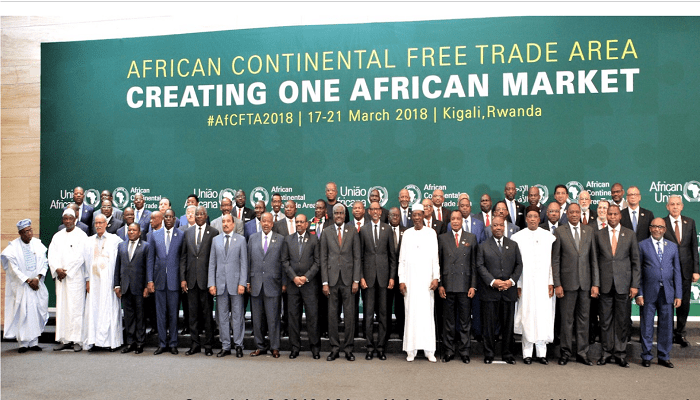The African Continental Free Trade Area (AfCFTA) Secretariat says pilot phase of the Pan African Payment and Settlement System (PAPSS) is ongoing in six West African countries to facilitate AfCFTA’s implementation. The AfCFTA Secretary-General, Mr Wamkele Mene, said this in Abuja while on official tour to Nigeria. PAPSS is a centralised payment and settlement market infrastructure for processing, clearing and settling of intra-African trade and commerce payments. Adopted in July 2019 by the African Union Heads of State as the payment and settlement system to support the implementation of the AfCFTA, PAPSS is expected to create new financial flows and successfully facilitate trade and other economic activities among African countries.
Afreximbank is the operator and the main Settlement Agent for PAPSS. The Bank will provide settlement guarantee on the payment system as well as overdraft facilities to all settlement agents. Interim Governing Council of PAPSS had in December 2020, in Cairo met on step towards operationalisation of the payment system which was developed by African Export-Import Bank (Afreximbank), under the auspices of AfCFTA Secretariat and AU. Mene said that the system which would be ready at the end of 2021 was the first major step taken in addressing some challenges related to the cost of currency convertability under AfCFTA implementation. “We have started a piloting phase of the Pan-African payment and settlement platform of six countries in West Africa who have switched on to the platform. Transactions are already happening within these six countries that are at an advanced stage of the pilot project.
“So, the platform will make a significant contribution and our estimate is that it will reduce the cost of transactions by five billion dollars annually, being the aggregate amount that is spent on currency convertibility,” he said.
Mene further said that Africa has 42 currencies and the cost of the currency convertibility was actually a constraint to intra Africa Trade.
This, he said was making us to feel inefficient and our trade unnecessarily expensive, thereby adding to the cost of doing business especially the Micro, Small and Medium Enterprises (MSMEs). “When the system is fully up and running, you will be able to transact with somebody in Kenya in Naira and they will receive Kenya shillings and Afreximbank will be the correspondent facility. We are working with them as the Secretariat but they have been very strong in investing in African solutions and this Pan-African payment system certainly in the last 60 years, it is one of the most significant achievements. We are not going to have a common currency overnight in Africa, we are still going to grapple with this issue of different currencies. But with the payment and settlement system we have taken the first major step in addressing some of the challenges that are related to the cost of currency,” he noted.
According to him, he is encouraged by the way the six piloting countries are understanding the importance of the system to African economy.
The interim PAPSS Governing Council is comprised of Central Bank Governors of the six countries of the West African Monetary Zone (WAMZ) for pilot phase of PAPSS, AU Commissioner for Economic Affairs, AfCFTA Secretary-General and a representative each of African Development Bank and Afreximbank. The Council is charged with providing regulatory oversight to ensure the success of the payment system.
Meanwhile Mene, said that 38 countries have now deposited their instrument of ratification of the agreement establishing the AfCFTA.
Mene said that it was at the initial stages of AfCFTA implementation.
The 55-member states of the Africa Union (AU) established the AfCFTA to create a single continent-wide market for goods and services and to promote the movement of capital and natural persons. He said though ratifying an international instrument involved a lot of processes but governments were encouraged to be fast for full AfCFTA implementation and benefits across the continent. On Jan. 1 AfCFTA implementation officially came into force to deepen economic integration and promote single market of goods and services on the continent.
“We are still waiting for others to ratify the agreement. But I am not worried that we are about 38 because in ratifying any international instrument, processes including legal and political processes needed to be followed for a country to be in a state of readiness. There are countries that are ready with custom’s infrastructure that is required to be able to trade in a commercial and meaningful sense, examples are South Africa, Egypt, Ghana and Kenya. These are countries that have introduced the necessary customs procedures for the trading to start happening,” he noted.
The Secretary-General noted that it was at the initial stages of the implementation, and also negotiating outstanding areas of the phase one which comprised trade in goods and services. He said that phase two negotiation which would start around July or August would focus on intellectual property rights, competition policy, women in trade and digital trade.
According to him, these are the new generation trade issues that will be the next area of focus. He further said that the Ambition was by 15 years from now 97 per cent of products traded in Africa should be at zero duty. He described it as a very ambitious objective, which would boost intra Africa Trade by reducing barriers to trade.

